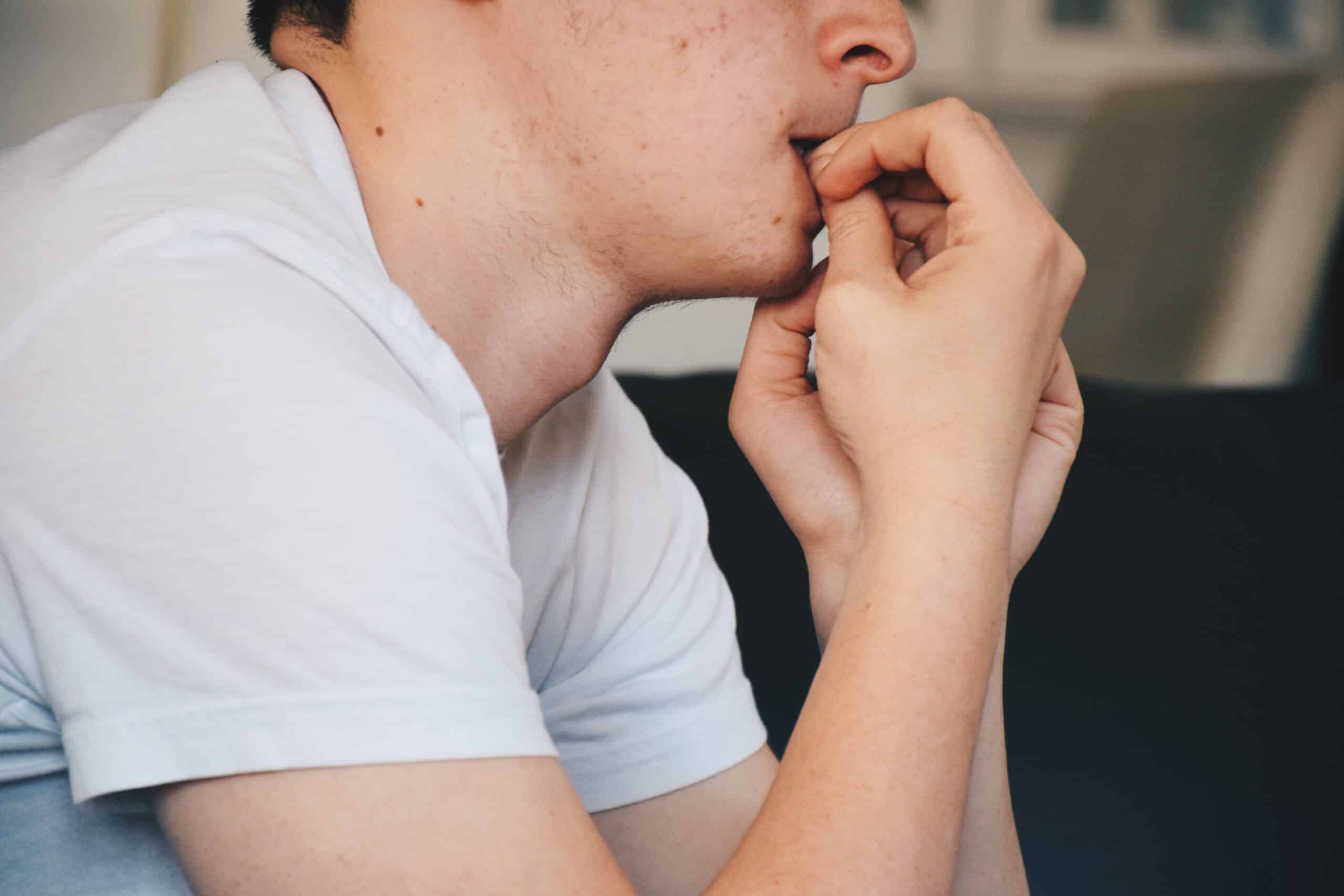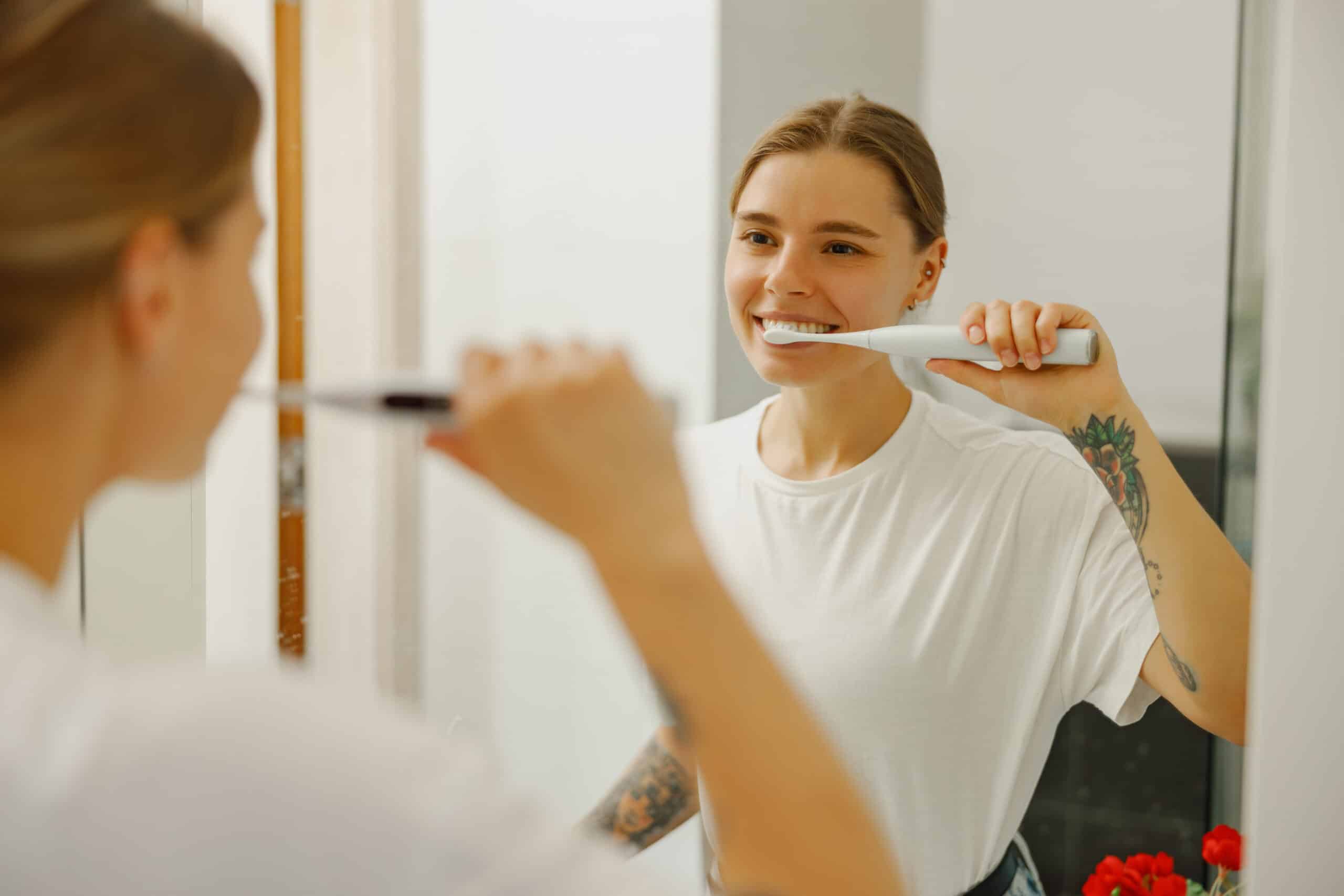- What causes bad breath (halitosis)?
- How halitosis can be a sign of periodontal disease or other health conditions
- How to get rid of bad breath
- Can your dentist help eliminate bad breath?
It’s Valentine’s Day. You and a special someone are enjoying a romantic date. Things are going smoothly so you decide to go in for a kiss. Your date moves closer to you, but before the moment of truth, they suddenly recoil – bringing the entire evening to an awkward and embarrassing standstill.
What happened? Could it be bad breath?
Bad breath, medically known as halitosis, can certainly be the cause of not just ruining your big date, but also spoiling what could be other positive social and business interactions.
Halitosis strikes almost everyone at some point, and there’s never a good time to have it. To learn how to get rid of bad breath, we first should look at what causes bad breath in the first place.
What causes bad breath?
You can have halitosis for a number of reasons, including:
- The food you ate: Did you order a garlic-laden Caesar salad at dinner? Or perhaps something smothered in onions? Everything you’ve eaten needs to be broken down in your mouth before swallowing. Until the food has passed through your body, your breath could still smell of it, especially if you’ve consumed strong-smelling food. Brushing, flossing, and mouthwash may cover up the odour, but only temporarily.
- Poor dental habits: Maybe you forgot to brush or floss before meeting your date, or have a poor dental hygiene routine in general. Not brushing or flossing daily can cause food particles from previous meals and snacks to remain in your mouth. This can promote bacterial growth between your teeth, along the gum line, and on your tongue. Improper cleaning of dentures can also cause bacterial growth in your mouth
- Smoking: Smoking or chewing tobacco-based products can also result in bad breath, as well as many serious health issues.
- Dry Mouth: Dry mouth, medically known as xerostomia, can also trigger bad breath. This condition signals that your mouth isn’t producing enough saliva to keep your mouth moist, eliminate acids produced by plaque, and wash away dead cells from your oral cavity. These cells, which collect on your gums and tongue and on the inside of your cheeks, can decompose and cause bad breath if not washed away. Dry mouth doesn’t necessarily mean you have a medical condition, but can merely be the side effect of certain medications or breathing through your mouth too much.
What is chronic halitosis?
Chronic halitosis – bad breath that never seems to go away or a bad taste in your mouth – can signal health issues that might need medical attention.
For example, periodontal disease, also known as gum disease, is caused by the buildup of plaque on your teeth that can irritate the gums and results in bone loss. The bacteria involved in this condition can cause chronic halitosis if left untreated.
Cavities can also make a comfortable home for bacteria, which can lead to consistent bad breath when not addressed and fixed.
Other conditions that can cause bad breath are pneumonia, bronchitis, chronic sinus infections, post-nasal drip, diabetes, and acid reflux. Halitosis can also suggest trouble with your kidneys or liver.
How to get rid of bad breath
Let’s rewind your Valentine’s Day date and look at a few ways that can help everything go more smoothly!
- Avoid strong-smelling foods: Whether you’re planning a special evening for two, or about to woo that new business client over lunch, try to avoid eating anything that might leave an odour. Although garlic, onions, and fish are obvious culprits, there could be other food that might cause you to have halitosis. Ask your dentist or a nutritionist about which foods to avoid when it really counts.
- Brush twice daily: You can give your mouth a fighting chance against bad breath by brushing twice per day with fluoride toothpaste to remove food debris and plaque, preventing the buildup of bacteria. Replace your toothbrush when it becomes worn, usually after 2 – 3 months, or after you’ve had an illness.
- Floss at least once per day: Your brush might not be able to remove food particles and plaque between your teeth. Flossing can help keep those areas in your mouth clean and reward you with fresh breath.
- Clean your tongue: Bacteria can grow on your tongue too, so be sure gently clean it with your toothbrush or a tongue scraper after you brush.
- Use mouthwash: Rinse with an antibacterial mouthwash twice per day, or whenever you feel the need.
- Always be prepared: Sometimes meetings pop up unexpectedly, so keep an extra toothbrush and floss at the office, in your handbag, or in your locker at school.
- Thoroughly clean dentures: You can stunt bacterial growth and keep halitosis at bay by taking your dentures out at night and giving them a thorough cleaning before replacing them in the morning.
- Stop smoking: Your dentist can give you advice on protecting your teeth and your health with effective stop-smoking techniques.
- Keep your mouth hydrated: When your mouth feels dry, drinking water can help wash away bacteria before it grows. You can also induce saliva flow with chewing gum or by sucking on candy (go sugarless on both if you can).
- Visit your dentist regularly: Getting routine checkups with your dentist can go a long way to keeping your mouth clean and healthy. Your dentist can also treat conditions such as periodontal disease that can lead to chronic halitosis.
Be sure to discuss with your dentist any concerns you may have about bad breath. Chances are, they’ll be able to recommend a solution to help you eliminate this condition. However, if they determine that the cause isn’t an oral health issue, you may need to see your family doctor for diagnosis and treatment.
With these tips, you’ll be to prevent halitosis and enjoy better social and business interactions. Plus, your Valentine’s Day date will go off without a hitch thanks to better oral habits that encourage fresh breath. We truly hope that your date has done the same!
Eliminate Bad Breathe with Dental Care at Yonge and Eglinton in Toronto
If you suffer from bad breath, or have a dry or bad taste in your mouth, your social life, career, and self-confidence might suffer. Take steps to better maintain your oral health with regular dental visits that will help eliminate halitosis.
If you have any concerns about bad breath or your overall oral health, give Yonge Eglinton Dental a call today at 416-932-2222 or visit us online to book an appointment. We’d love to see you!








